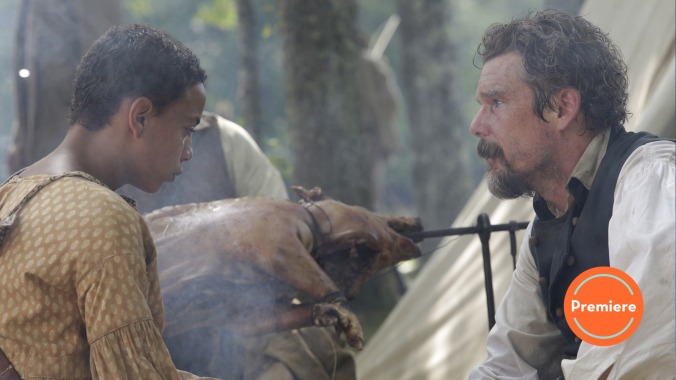Joshua Caleb Johnson and Ethan Hawke star in The Good Lord Bird Photo: Kevin Lynch/Showtime
The first time you realize John Brown might be insane, he’s literally spitting mad. The famed abolitionist has stopped in for a haircut at a local saloon, somewhere in the battlefield of Bleeding Kansas—and the saloon’s owner, one Dutch Henry (played by TV’s David Morse) has not only made an aggressive defense of slavery, he’s taken the Lord’s name in vain. Brown, played by Ethan Hawke, turns on a dime, frothing and furious. He is a man possessed.
Frankly, it rules. The Good Lord Bird, based on James McBride’s 2013 novel, is largely a character study of Brown, a man willing to use any and all tools at his disposal in order to achieve his goal: the abolition of slavery in America. In this first episode alone, he blatantly lies after swearing on the bible, functionally kidnaps a child, and brutally decapitates a man who is at most tangentially related to the target of his wrath. And is he so wrong?
A pop culture depiction of John Brown’s crusade is in an inherently tricky position. From our current perspective in 2020, it’s easy (and correct) to condemn the atrocity of slavery. It is probably slightly harder, at least for some people, to acknowledge that Brown’s radical, violent methods were often justified. And it’s harder still to make comparisons between Brown’s violence in the pursuit of abolition and widely condemned, so-called “violent” methods of protest today. (Breaking a Target window? Exactly as bad as decapitation.) As Brown says the first time we see him, just before his execution, heavily bearded, freezing, eyes frost blue, “What a beautiful country.”
That The Good Lord Bird is roughly able to thread this needle is partly due to the tonal commitment of director Albert Hughes and writers Hawke and Mark Richard. In large part though, it’s due to the show’s viewpoint character and narrator, 13-year-old Henry Shackleford, a.k.a. Henrietta Shackleford, a.k.a. Onion. Onion, a slave held in bondage by Dutch Henry, is caught in the crossfire when Brown gets his father killed, and eventually becomes attached to Brown’s outfit. Played by newcomer Joshua Caleb Johnson, Onion is largely passive and bemused, moving from injustice to injustice as he gets swept up in the fight. And, mistaken for a girl by Brown, Onion quickly takes advantage of the army’s collective expectations for women, exempt from hard labor or having to carry a weapon—he’s in it for himself.
The rest of the cast is pretty game for the material, and helps “Meet The Lord” veer between bleakness and comedy. In particular, the episode broadly positions John Brown as a man leading an army of failsons. One of these sons, Owen, is a dry wit with a strong knowledge of the Bible who teaches Onion how to read and write, and serves as the show’s strongest foil to Brown. Another, Frederick, is a soft, kind man who takes a liking to Onion and shows him how to shoot before in turn being shot, in perhaps the most straightforwardly sad moment of the episode. Several of the sons apparently get wet dreams notable enough that their father needs to mention them in his prayers. And amid this frenetic family, Ethan Hawke effectively anchors the show by letting himself be absolutely insane—once he gets going, Brown really gets going.
Onion aside, the other Black people in Brown’s orbit treat the old man with a similar detached sense of humor, simultaneously respecting his commitment to the cause and keeping their heads down to stay away from his chaotic energy.(As Onion puts it, Brown is “a real white man.”) There’s Bob, a man who happens to meet Onion, bails at the last minute, afraid of the level of bloody commitment Brown requires. An earlier scene cuts directly to a close-up of Keith David saying “I don’t know nothin’ about no John Brown,” which is funny under pretty much any circumstances.
That’s to say that I think The Good Lord Bird is going to try to make a very specific point: Brown’s goals are obviously admirable, and the system he fights obviously should have been burnt to the ground. But amid that broader struggle, everyone faces the experience of the day-to-day fight for survival, whether it’s a poor white family that dreams of having help (which is to say, a slave) or a farmer who, arrested under dubious circumstances, yelps “Are y’all gonna hang me or not? I’ve got chores.”
John Brown, The Good Lord Bird seems to argue, is capable of enacting the historical change in deed precisely because he is divorced from that struggle. In one especially fun moment, he asks a rabbit if it holds fire in its heart for justice. Somehow, he and his men win the Battle Of Black Jack, even though Brown puts himself out in front of incoming fire. And, back in the beginning, when Dutch Henry complains that Brown owes him money for the slave he has murdered, Brown bellows: “Charge it to the Lord, heathen!” I, for one, cannot wait to start using that retort in my posts.
Stray observations:
- Hi everyone! I’m excited to go through this show with you—it’s definitely a John Brown sort of historical moment, to say the least.
- If you want to learn more about John Brown’s truly insane life as grounding for the show, check out the multi-episode series Pod Damn America did about his life, largely drawn from David Reynolds’ book about Brown.
- “No man or woman in bondage ever prospered stating their true thoughts to the boss.”


 Keep scrolling for more great stories from A.V. Club.
Keep scrolling for more great stories from A.V. Club.